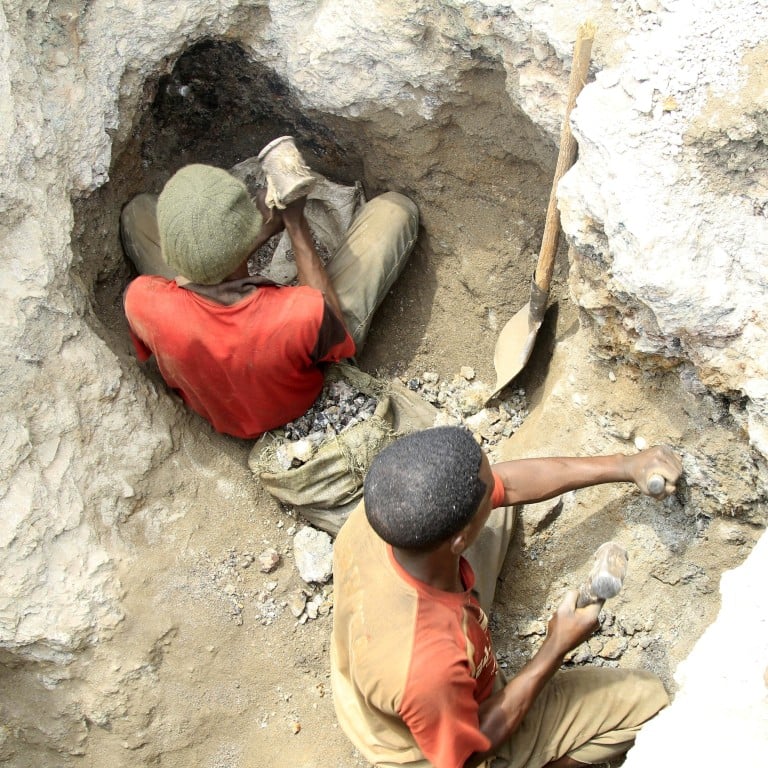
Pressure grows between African mineworkers and their Chinese bosses
- Videos purporting to show violent confrontations circulate on social media, highlighting human side of China-Africa relations
- Observers say a combination of cultural differences, management style and poor working conditions are to blame
The Central African nation has an estimated 3.4 million tonnes of cobalt, almost half the world’s known supply. But in a country where the World Bank estimates three-quarters of the population live on less than two dollars a day, the mineral rush has also come with challenges.
Thousands of “artisanal miners” have moved into the area, extracting cobalt by hand or rudimentary tools. Sometimes illegal miners intrude into mines legally assigned to local or foreign entities, leading to confrontation.
China’s cobalt mines in spotlight as DRC seeks to renegotiate deals
In one video, Chinese managers of a mining site in Kolwezi can be seen watching and recording as two members of the armed forces (FARDC) beat artisanal miners accused of trespassing at La Compagnie Miniere de Musonoie Global SAS, a Chinese copper mining company majority-owned by Zijin Mining Group.
According to a FARDC statement, Chinese managers recruited the soldiers to beat the miners who were suspected of sneaking into the mine site to steal minerals. The army officers have since been sentenced to terms ranging from 18 to 24 months for premeditated assault on two artisanal miners.
Three Chinese have also been sentenced to four months imprisonment for complicity and fined 1 million Congolese francs (US$500) by a court in Lualaba province.
The Chinese mining company at the centre of the controversy has denied it took part in the abuse. The company said the soldiers “whipped the intruders in a personal capacity and not on the instruction of the hierarchy of the company”.
Congolese cobalt miners, and China’s role in improving their conditions
Fights between Chinese managers and local employees in the DRC have also been reported, including one on June 30 involving a Congolese employee and a Chinese manager at Tenke Fungurume Mining, also in Kolwezi, over working conditions and alleged mistreatment.
The Chinese embassy in the DRC has yet to respond to the reports.
Christian-Geraud Neema, an independent Congolese mining and policy analyst, said the phenomenon was not new, but had existed for years in various Chinese-led projects, whether in infrastructure, SME businesses or mining. “It’s a result of cultural and management style between Chinese and Africans,” he said.
“On the one hand, you have the Chinese management style – harsh treatment of locals, lack of compliance to basic labour rules – and on the other hand, we have local workers who, although they are not always an example of hard rules-following workers, are expecting better treatment and respect from the Chinese … which they don’t receive.”
China’s demand for electric cars drives cobalt prices to two-year high
Neema said the recent public outrage over the issue was a result of the broadcast and sharing of videos documenting examples of alleged abuse on social media, rather than a case of incidents becoming more frequent. And he said some of the disputes may be due to the nature of an industry that demands a heavy workload and very long shifts.
“So, in an industry where you’re constantly looking to cut costs, increase benefits, the likelihood of abuse is high, especially in a country like the DRC where you have failed institutions,” he said. “Let’s not forget that the general labour environment of DRC is not an example of labour rights compliance.”
Conflicts between workers and Chinese employers have also occurred in other African countries, such as Zambia, Nigeria, South Africa, Kenya and Senegal.
In Zambia, two men and a woman last year allegedly broke into a Chinese-owned clothing factory and killed three Chinese nationals before setting fire to the building. The alleged attackers were reportedly disgruntled employees. The victims were the factory’s bosses.
Police free three Chinese workers kidnapped in Nigeria
Steve Tsang, a political historian and director of SOAS University London’s China Institute, said the Chinese state was interested in government-to-government relations and increasing trade by agreements, not in how citizens of African countries may be affected on the ground.
“Chinese companies do not treat their employees well generally, and so it is not exceptional that African employees of Chinese companies are badly treated”, he added.
Another factor he said was “the rising party-centric nationalism of the [Chinese President] Xi Jinping era [which] encourages and supports Chinese nationals to put China and the Chinese first. This has the effect of others, particularly people of colour, being treated less well, in China and in places where the Chinese call the shots”.
China cancels Democratic Republic of Congo loans as it joins belt and road
Yun Sun, director of the China programme at the Stimson Centre in Washington, said state-to-state ties between China and African countries were strong but relations at the grass roots level had always had problems, as the Chinese were perceived to be exploiting Africans.
“When interactions happen on the individual level, racism is no longer hidden. Especially when the Chinese enjoy superior social-economic conditions, the discrimination is aggravated,” she said.
Sun said that although the issue was not new, “the growing number of reports about it suggests that the Chinese presence is more prevalent than before, and the Chinese are increasingly enjoying their elite status in Africa”.

